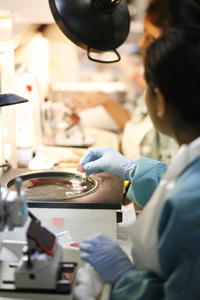Department of Pathology
Summer High School Research Program: Building the Future of Science & Medicine
The Montefiore-Einstein Summer High School Research Program, led by Drs. Amy Fox, Vice Chair for Clinical Research and Faculty Affairs, Pathology, Montefiore-Einstein, and Victoria Freedman, Associate Dean for Graduate Programs in Biomedical Sciences, Albert Einstein College of Medicine, is inspiring Bronx high school students to pursue careers in science.
Learn More >
The Department of Pathology at Montefiore Medical Center is one of the largest and most comprehensive medical center laboratories on the east coast. With a staff of nearly 700 associates and more than 50 pathologists and PhDs, our laboratories perform more than 10 million laboratory test results, interpretations, and diagnostic consultations each year.
Laboratory Diagnostics and Testing
It has been estimated that about 70% of medical decisions involve lab testing run by pathologists. The life of a pathologist is about more than just reading slides and writing reports. In addition to overseeing blood banks, practicing transfusion medicine and ensuring that the blood supply is safe and used appropriately, pathologists examine blood cells to determine cholesterol levels, examine tissues for such diseases as cancer, identify microorganisms that cause infections and test the reaction of infecting bacteria to different antibiotics. Although they work behind the scenes, pathologists are essential to the roles physicians play in their patients’ lives.
The Department of Pathology also houses Montefiore Medical Laboratories (MML), which serves as the reference laboratory to many hospitals and clinics in the community. Montefiore Medical Center is one of a select few hospitals in the New York metropolitan area offering reference lab services to the medical community. We are also actively involved in the community, training nurses in our School Health Program to bring the highest quality of clinical pathology care to students of all ages.
Since its establishment in 1963, the Department of Pathology has worked toward the goal of making lives better everyday by consistently staying at the forefront of: the most technologically advanced diagnostic systems, outstanding service to physicians and patients, the highest national quality assurance standards, which include turnaround time of test results, and quality control of testing. Our department is also credited for several groundbreaking developments, including the following:

- Establishing methods for understanding the pathophysiology of thrombotic thrombocytopenic purpura (TTP)
- Creating methods for in-situ molecular analysis of genetic diseases
- Establishing methods for measuring the immunoserology of AIDS
- Setting the criteria for diagnosis of subclinical thyroid disease and thyrotoxicosis
- Formulating the American Thyroid Association criteria for the use of laboratory tests in thyroid disease
A Commitment to Research
The Department of Pathology understands that tomorrow's advancements derive from today's training and research endeavors. We receive substantial funding from national health institutions and major organizations to conduct basic, translational, and clinical research in the mechanisms of disease and the development of new therapeutics, such as for Alzheimer's disease. Our primary programs and areas of study include:
- Alzheimer's Disease
- Multiple Sclerosis
- Neuro AIDS
- Parasitology
- Cancer Biology
- Immunology
- Vascular Biology
- Cytology and Cytogenetics
|
See why so many applicants choose Montefiore Einstein 
Take the Pathology Residency Program Virtual TourTake the Pathology Fellowship Program Virtual Tour |


